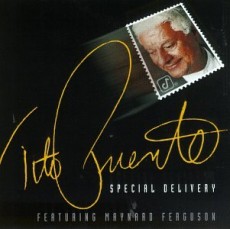
Daily Dose Of Jazz…
Tito Puente was born Ernesto Antonio Puente on April 20, 1923 at Harlem Hospital in New York City and spent the majority of his childhood in Spanish Harlem. As a child his mother sent him to 25-cent piano lessons and by the age of 10, he switched to percussion, drawing influence from jazz drummer Gene Krupa. He later created a song-and-dance duo with his sister Anna in the 1930s, intending to become a dancer, but an ankle tendon injury prevented him pursuing dance as a career. When the drummer in Machito’s band was drafted to the army, Puente subsequently took his place.
After serving three years in the Navy during WW II, Tito used the GI Bill to study music at Juilliard School of Music, taking conducting, orchestration and theory. During the 1950s, Puente was at the height of his popularity, and helped to bring Afro-Cuban and Caribbean sounds, like mambo, son, and cha-cha-cha to mainstream audiences. He moved into more diverse sounds, including pop music, bossa nova and others, eventually settling down with a fusion of Afro-Cuban and Latin jazz genres that became known as “salsa” (a term that he disliked).
Tito has received the key to the City of New York, the James Smithson Bicentennial Medal from the Smithsonian and been inducted into the National Congressional Record. He has won five Grammy Awards, and won a Grammy at the first Latin Grammy Awards for Best Traditional Tropical Album for Mambo Birdland. He was posthumously awarded the Grammy Lifetime Achievement Award in 2003 and has his timbales on display at theSmithsonian.
He has had a post office in Spanish Harlem named after him, an amphitheater in San Juan Puerto Rico, performed at the closing ceremonies for the 1996 Olympics, appeared as himself on the Simpsons episode “Who Shot Mr. Burns?”, and has a star on the Hollywood Walk of Fame,
In early 2000, he shot the music documentary Calle 54. After a show in Puerto Rico, percussionist, timbale player and bandleader Tito Puente suffered a massive heart attack and was flown to New York City for surgery to repair a heart valve but complications developed and he died during the night of May 31 – June 1, 2000.
More Posts: timbales


